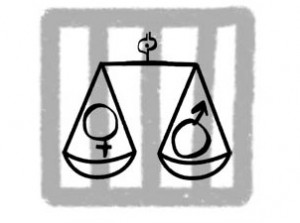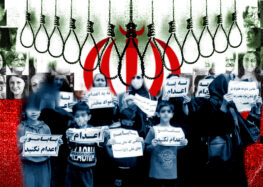Report on the Status of Women Human Rights Defenders — April 2009
——————————–
II. Women’s Human Rights Defender and 2003 Nobel Peace Laureate Shirin Ebadi Targeted
III. Pressure on the Activists of the One Million Signatures Campaign Continues Unabated
IV. Freedom of Assembly Curtailed
V. Stringent Control of Women Human Rights Defenders by the Courts and Intelligence Ministry
As the Islamic Republic of Iran celebrates its thirtieth anniversary, human rights abuses are on the rise. Women’s rights activists advocating for legal reforms and the protection of women’s rights have been increasingly targeted. Since our last report,1 the most prominent human rights defender, Shirin Ebadi, has come under fire; a prison sentence of a woman’s rights activist has been implemented for the first time in the history of the Islamic Republic of Iran; and other women’s rights activists have been targeted, harassed, arrested, summoned, tried and barred from travel. The following report covers the pressures on women human rights defenders since June 2008.
——————————–
I. Women’s Rights Defender’s Jail Sentence Begins–A New Chapter in the Persecution of Women’s Rights Activists
Alieh Eghdamdoust,2 57, is the first women’s rights activist in Iran to have her prison sentence implemented. Her sentencing was based solely on her activities promoting women’s rights. On 12 June 2006, Eghdamdoust was arrested along with 70 others during a peaceful protest in Hafte Tir Square in Tehran in support of women’s rights. She spent approximately a week in prison. Subsequently, she was charged with security violations, including acting against national security through participation in an illegal protest and disruption of public order.3 In her first trial, Eghdamdoust was sentenced by the 15th security branch of the Revolutionary Courts to a three-years and four months mandatory prison sentence and 20 lashes. The appeals courts upheld three years of the mandatory prison sentence, reducing her original sentence by four months and 20 lashes.
On 1 February 2009, Eghdamdoust was transferred under guard supervision to the Office of Implementation of Sentences at the Revolutionary Courts, where she began serving her three-year sentence.4 According to her lawyer, Nasim Ghanavi, Alieh’s participation in the peaceful protest in Hafte Tir Square was legal, based on the constitution, which allows for public protests. Additionally, Ghanavi points to the fact that Alieh was a political prisoner in the 1980s and that the court considered this background when issuing a sentence against her. According to Ghanavi the only option left for Eghdamdoust is to request a Judicial Review, allowable under the 18th Amendment of the Law Regulating Public and Revolutionary Courts.5 Likewise, other women’s rights activists have been acquitted on similar charges,7
The sentences of some of the others in this case have been appealed and rulings have been issued by the appeals court, while others are still awaiting the outcome of their appeals ruling. Bahareh Hedayat,8 a student and women’s rights activist, was initially sentenced to a two year suspended prison sentence (a probationary sentence that can be changed to a prison term at any time) for the period of five years,9 which was upheld by the appeals court. Masoumeh Zia was initially sentenced by the 28th branch of the Revolutionary Courts to a one-year mandatory prison sentence and a three million Rials (approximately $300) fine by the 1060 Branch of the Tehran Public Court in lieu of lashings and imprisonment.10 The appeals court reduced the initial prison sentence to a one year suspended prison sentence for the period of three years and reduced the fine to two Million Rials (approximately $200). During the course of the three years Zia is expected to introduce herself to the local police station every four months.11 Bahman Ahmadi Amouie, a journalist present at the scene of the protest, was initially sentenced to a six months suspended sentence in court, which was upheld by the appeals court.12 Azadeh Forghani, as reported in our previous report on women’s rights activists,13 had been issued a suspended sentence of two years that was reduced to a two Million Rial fine (approximately $200) in appeals. The status of the appeals rulings or appeals hearings of the others charged in this case is still unclear.
The discrepancies and differences in the manner in which the cases of Ali and Eghdamdoust have been treated by the courts is of great concern, and at a minimum signifies that the courts do not follow a similar process in reviewing and assessing similar cases before them. Additionally, the lawyers representing Eghdamdoust have pointed out that they had never been officially served with papers regarding the final ruling in Eghdamdoust’s case, preventing them from filing a petition with the courts requesting a Judicial Review.14
——————————–
II. Women’s Human Rights Defender and 2003 Nobel Peace Laureate Shirin Ebadi Targeted
Over the past year, Shirin Ebadi has been targeted by the conservative press and slandered. In December, this harassment took on a different and more violent form, targeting both Shirin Ebadi and the NGO she runs, the Defenders of Human Rights Center (DHRC), and resulted in the Center’s closure. Both Ebadi and the lawyers working for the DHRC represent, on a pro-bono basis, individuals accused of political crimes. Many of the women’s rights activists charged with security crimes have been represented by Ebadi and the team of lawyers working with the DHRC. The pressures placed on Ebadi and the DHRC are a sign of the worsening human rights situation in Iran. If Ebadi, given her international notoriety and position, is not immune from this type of pressure, then other women human rights defenders (WHRDs) are at increasing risk for harassment and crackdowns. The pressures on Ebadi may also be a signal to other human rights defenders as presidential elections near, pressing them into silencing their voices of dissent and criticism.
- Closure of the Defenders of Human Rights Center: On Sunday, 21 December 2008, plain clothes and uniformed police and security officials raided the offices of the Defenders of Human Rights Center, a human rights organization headed by Nobel Peace Prize winner Shirin Ebadi, preventing a celebration of the 60th anniversary of the Universal Declaration of Human Rights by the Center and sealing their offices. According to reports from those present at the scene, the raid on the office included both physical and verbal violence.15 The Center is the main human rights organization in Iran, providing pro-bono services to those accused of political crimes, providing support to families of imprisoned political activists and providing regular reports on the situation of human rights in Iran.16 The closure of the DHRC signals a shift in the approach of security forces and attests to the lack of tolerance on their part, not only for dissent by political and social activists, but also for any defense, even legal defense in court, provided to these individuals.
- Raid on the private office of Shirin Ebadi: On 29 December 2008, the private law offices of Shirin Ebadi were raided by officials who identified themselves as tax officials. The computers in the office were seized. Especially worrisome was the confiscation by the officials of private client files containing information on clients accused of political crimes.17
- Mob attack on the home of Shirin Ebadi: On 1 January 2009, a mob of approximately 150 people demonstrated in front of Shirin Ebadi’s home chanting slogans such as: “Israel commits crimes and Ebadi provides support.” The outside façade of Ebadi’s home was vandalized and slogans were written on the building walls. The plaque for Ebadi’s law office was torn from the outside wall and stomped.18 Despite the fact that police were present at the scene, they took no steps to stop the mob from committing these acts or to disperse the protesters.19
- Arrest of Jinous Sobhani, Secretary of the DHRC: On 14 January 2009, Jinous Sobhani, who served as a secretary for the DHRC and the Center for Mine Victims, an NGO also headed by Shirin Ebadi and housed in the offices of the DHRC, was arrested. Prior to her arrest, security agents showed up at her home at 6:00 am and searched the premises, seizing her personal belongings.20 No reason was provided for the arrest of Sobhani, who is member of the Baha’i Faith. Baha’is have come under increasing attack in recent months, with a number of them being arrested. Ebadi has taken up the legal representation of a number of Baha’is, for which she has been targeted for harassment by the conservative press. On 11 March 2009, Jinous Sobhani was released on approximately $70,000 (7 billion Rial) bail pending the setting of her court date.
——————————–
III. Pressure on the Activists of the One Million Signatures Campaign Continues Unabated
The One Million Signatures Campaign is a grassroots initiative working to raise public awareness about the impact of discriminatory laws on society and collecting signatures in support of a petition addressed to the Iranian Parliament asking for the reform of these laws. Since its inception in August 2006, and despite its peaceful and civil nature, the members of the Campaign have come under fire and have been summoned to court, summoned for interrogation, detained, sentenced to prison, had their meetings broken up by police, their homes searched and property seized and some have been banned from travel. This report highlights the pressures on Campaign activists since May 2008, the date of our last report on women human rights defenders.21
1. Arrest of Campaign Members
- Nafiseh Azad, Bigard Ebrahimi and Shahin Ebrahimi: On 30 January 2009, three members of the Campaign were arrested in the Tochal Mountains north of Tehran, while collecting signatures in support of the Campaign petition asking for the reform of laws that discriminate against women. Bigard Ebrahimi and Shahin Ebrahimi were released on a third party guarantee of 200 Million Rials (roughly $20,000)22 within a day. However, a temporary arrest order was issued for Nafiseh Azad, who was detained in Vozara Detention Center for six days and released on 4 February 2009. During the time of her detention, security police came to the home of Nafiseh Azad, which she shares with two roommates, Elnaz Ansari and Aida Saadat, also members of the Campaign, in order to search the premises and seize property. The search of the home turned violent, and police beat both Elnaz Ansari and Nafiseh Azad’s husband, who had accompanied police to the home of his wife in Tehran where she lives and attends university. Azad’s husband, Vahid Maleki, was handcuffed during the search of his wife’s home and during the scuffle. Azad was released on 500 million Rial Bail (roughly $50,000) in the form of a third party guarantee. During these six days she was detained at Vozara Detention Center, which is intended as a temporary detention center and has poor sanitary conditions.23 Azad was charged with actions against national security through the spreading of propaganda against the state.24
- Esha Momeni: Esha Momeni, a graduate student at California State University Northridge and a member of the One Million Signatures Campaign in California, was arrested on 15 October 2008 while on a visit to Iran. During this time, Esha had conducted video interviews with several members of the Campaign as part of her graduate school thesis. After her arrest, Esha was transferred to Evin Prison Section 209, which is managed by the Intelligence Ministry. She was released on 10 November 2009.25 According to Hassan Hadad, the Prosecutor General of the Revolutionary Courts, Esha Momeni faces charges of “spreading propaganda against the state.”26 Esha was released on 2,000 million Rial bail, in the form of a property deed, put up by her family. Despite claims by the Judiciary spokesman, Mr. Jamshidi, Esha has been banned from travel and cannot return to the United States to continue her studies.27 The arrest of Esha constitutes not only the continuation of pressure on women’s rights activists, especially members of the One Million Signatures Campaign, but is also part of a systematic campaign of intimidation and a crackdown against dual nationals. Iranian-Americans in particular are seen as facilitators of connections and contacts between activists on the ground and the West. The pressures on dual nationals intensified with the arrest of several prominent Iranian Americans, including Haleh Esfandiari and Kian Tajbakhsh, in April 2007.
2. Pressure on Ethnic Minority Women’s Rights Activists
- Hana Abdi, who was arrested on 6 November 2007, was released from prison on 26 February 2009. Abdi was arrested in the city of Sanandaj in Kurdistan Province, and initially sentenced to serve five years in prison in exile in a border town in West Azerbaijan Province. On appeal, the sentence of Abdi was reduced to 18 months. Abdi was released after serving the duration of her sentence.28 Sentences to be served in exile have been implemented in the case of minority rights activists and women minority rights activists including Hana Abdi and Zeinab Bayazidi. These sentences are intended to inflict greater hardship on these activists and their families, while weakening the support they may receive from their local communities. During the time of her imprisonment, Hana Abdi spent several months in solitary confinement and was transferred to several different prisons, as some did not have facilities for political prisoners. In the end, Abdi was transferred to a prison in Meshkin Shahr.29 While Abdi has served her sentence in this case, she has another case pending against her in relation to a hunger strike while in prison. Fatemeh Goftari, another female Kurdish rights activist was sentenced to a year in prison in relation to a similar charge.30
- Zeinab Bayazidi, a women’s rights activist, member of the Kurdistan Human Rights Organization and of the One Million Signatures Campaign, was arrested on 9 July 2008 in the City of Mahabad, Kurdistan Province, after being summoned to the local office of the Intelligence Ministry. In a closed-door trial, without access to a defense lawyer, Bayazidi was charged with “acting against national security,” “supporting a Kurdish political organization,” “spreading of propaganda against the state,” “conducting interviews with foreign media,” and “membership in an illegal organization.” Bayazidi was sentenced to serve four years in prison in exile in the city of Zanjan. Her appeals process, which took only two days to complete, was unusually speedy and suffered from legal irregularities. Bayazidi is currently serving her prison term in Zanjan, although her lawyer has requested a Judicial Review in her case in accordance with the 18th Amendment of the Law Regulating Public and Revolutionary Courts.31 Bayazidi was served with court documents indicating that her suspended prison sentence of six months for the period of four of years in an unrelated case had been changed to a mandatory sentence,32 increasing her total time in prison to four years and six months.33
- Ronak Safazadeh, a women’s rights activist, member of Azar Mehr NGO and a member of the One Million Signatures Campaign, was arrested on 10 October 2007, and remains in prison in the city of Sanandaj in Kurdistan Province. No sentence has been issued in the main case pending against Safazadeh.34 An initial court hearing was held in the case against her in March 2008, but no sentence was issued. A second hearing is reportedly scheduled for Saturday 28 February 2009.35 Safazadeh was, however, tried in a secondary case for illegally crossing the border and for having in her possession illegal satellite equipment. She was sentenced to 9 months imprisonment in this case.36
3. Search of Homes
Security officials have repeatedly gone to the homes of members of the Campaign to break up their meetings. These women’s rights activists have been repeatedly told by security officials to refrain from holding meetings in their homes. Because Campaign activists have been systematically denied public space in the form of conference halls and office space to convene their meetings, they are forced to hold meetings in their homes. Additionally, several members of the Campaign have had their homes searched and property seized in the past few months.
- Sussan Tahmasebi: On 26 October 2008, five security officials entered the home of Campaign member Sussan Tahmasebi and proceeded to search her property and confiscate personal belongings, including handwritten notes, papers and her laptop computer. The agents entered Tahmasebi’s home after presenting a court order. Tahmasebi was also served with papers to appear in court for interrogation. She was interrogated on several occasions, the first of which lasted over five hours. The search of Tahmasebi’s home occurred after she was stopped at the airport and prevented from traveling.37
- Parastoo Alahyaari: The home of Parastoo Alahyaari, a member of the Campaign, was searched on Saturday 18 October 2008, and her laptop, CDs, books, picture albums and Campaign materials in her possession were seized. Two security officers from the Gisha Police station went to the home of Alahyaari, a member of the Volunteer Committee of the Campaign in Tehran, to search her home and seize property while asking about her whereabouts, as she was at her office at the time. Upon receiving a phone call from her mother, Alahyaari returned home, where she was presented with a summons to appear in court immediately. The security officials escorted Alahyaari to the Revolutionary Courts, where she was interrogated by Mr. Sobhani, the investigative judge in charge of her case. Because Parastoo had a business trip planned for that same day, she was released. On Friday 17 October 2008, Alahyaari, along with other members of the Volunteers Committee, was in Laleh Park, when the group was approached by police and security officials who asked them to disperse. Prior to allowing these women’s rights activists to leave the Park, the police asked Alahyaari and another member of the Volunteers Committee to submit identification cards.
4. Travel Bans
Several women’s rights activists, especially those involved in the One Million Signatures Campaign have been targeted by officials and prevented from travel abroad. This is apparently part of a larger effort to isolate Iranian human rights defenders from the international community.
- Nasrin Sotoodeh: On 10 December 2008, Nasrin Sotoodeh, lawyer and women’s rights activist, was banned from travel and her passport confiscated as she was leaving the country to participate in an award ceremony in her honor scheduled to take place on 12 December in Merano, Italy.38 Sotoodeh was selected as the recipient of the International Human Rights Prize, awarded by the organization Human Rights International. Sotoodehwas able to pass through the passport control check point, indicating that she did not have a travel ban. After going through passport control at Imam Khomeini International Airport, her name was announced over the airport PA system. Officials identifying themselves as agents of the Office of the President informed Sotoodeh that she had a travel ban and prevented her from travel. Sotoodeh was provided with a receipt and a summons for appearing in court to follow-up her travel ban.
- Sussan Tahmasebi: On 26 October 2008, Sussan Tahmasebi, a member of the One Million Signatures Campaign, was stopped at the airport and prevented from traveling. The manner in which she was detained at the airport was similar to that of Nasrin Sotoodeh, indicating that she also did not have a travel ban prior to being stopped at Imam Khomeini International Airport. After she was stopped at the airport, five agents went to her home to search the premises and seize property. Tahmasebi had been prevented from travel on three other occasions over the past two and half years. Her travel ban was lifted in February 2009.
Other women’s rights activists have also been targeted in a similar manner, including Parvin Ardalan, who was stopped in March 2008 on her way to Sweden where she was to receive a human rights prize, as well as Mansoureh Shojaie and Talat Taghinia. Since then, several human rights activists have filed a complaint against the authorities with respect to these travel bans.39
5. Court Hearings
- Parvin Ardalan, Maryam Hosseinkhah, Nahid Keshavarz, Jelve Javaheri: On 3 September 2008, four members of the One Million Signatures Campaign received mandatory prison sentences of six months. Parvin Ardalan, Maryam Hosseinkhah, Nahid Keshavarz and Jelve Javaheri were charged with security violations in relation to their activities on the sites of Change for Equality, the official site of the Campaign, and Zanestan, the webzine of the Women’s Cultural Center. The six-month mandatory sentence was issued by the 13th branch of the Revolutionary Courts and based on Article 500 of the Islamic Penal Code. In relation to this same case, Maryam Hosseinkhah was arrested in November 2007, and served 45 days in prison and Jelve Javaheri was arrested in December and served 30 days in relation to this case. These women’s rights activists, represented by Shirin Ebadi and Nasrin Sotoodeh, appealed the ruling, and a public appeals hearing was held on 27 January 2009. The appeals court has not issued its ruling as of this date. It should be noted that authorities systematically censor women’s rights activists.
The charges brought against these activists are in line with the strategy to censor and silence the voices of those working to promote women’s rights and to defend women human rights defenders who are persecuted. Along these lines, several women’s websites have been filtered repeatedly, with the sites related to the One Million Signatures Campaign bearing the brunt of this censorship effort. For example, the site of the Campaign, Change for Equality, has been filtered 19 times40 and the site of the Feminist School has been filtered 8 times. On 25 November 2008, in a mass censorship effort, 27 websites and weblogs based both inside and outside Iran reporting on women’s issues were filtered by authorities, including the site of Change for Equality, the sites of the Campaign in Hamedan, Azarbaijan, Zahedan, Shiraz, Mashad, Zabol, Amol, Ilam, Kermanshah, Rasht, Arak, and Karaj, California, Kuwait, Germany, Cyprus, Sweden, the Feminist School, the site of the Women’s Solidarity Network, the weblog of the men’s committee of the Campaign, the weblog of the working group on equal inheritance, the photoblog of the Campaign, and weblogs addressing women’s issues, such as Parandeh Kharzar, Zananeha, Havva, and Free Keyboard were blocked through this mass effort at censorship.41 Also, the sites of Focus on Iranian Women and Women’s Field have been filtered on several occasions in the past.
——————————–
IV. Freedom of Assembly Curtailed
- Nine Women’s Rights Activists Arrested on Day of Solidarity of Iranian Women: On 12 June 2008, nine women’s rights activists who had intended to convene a seminar in honor of the anniversary of the national day of solidarity of Iranian women (22nd of Khordaad, June 12), were arrested after security officials and police prevented the seminar from taking place. These women’s rights activists include: Nahid Mirhaj, Aida Saadat, Nafiseh Azad, Nasrin Sotoodeh, Jelve Javaheri, Jila Baniyagoub, Sarah Loghmani, Farideh Ghaeb and Alieh Motalebzadeh. The women were transferred to Vozara Detention Center and were processed and released within a few hours after their arrest.42 Since then all of these women’s rights activists have been charged by the Revolutionary Courts with disrupting public order and freed on bails ranging from personal guarantees to third party guarantees in the amount of 500,000 Rials (roughly $50,000). According to a statement issued by the coordinating committee of the seminar, “Officials have systematically denied women’s rights activists permits to hold peaceful public demonstrations and protests. Even small protests by women’s rights activists have been violently attacked by security forces and police. Additionally, women’s rights activists have been systematically denied the right to convene meetings and seminars. Meetings in their private homes too have been broken up. It is unfortunate that security forces fear the convening of simple meetings with limited participants of about 100-150 people to such a degree.”43
- Twelve Women’s Rights Activists detained for Assembling: On 26 March 2009, twelve women’s rights activists were detained on Sohrevardi Avenue in Tehran while meeting to visit families of imprisoned social and political activists. Those arrested were: Delaram Ali, Khadijeh Moghadam, Leila Nazari, Farkhondeh Ehtesabian, Mahboubeh Karami, Bahara Behravan, Ali Abdi, Amir Rashidi, Mohammad Shoorab, Arash Nasiri Eghbali, Soraya Yousefi and Shahla Forouzanfar. The group was taken to Niloofar Police Station whereupon some were transferred to Galoobandak Police Station. All were later transferred to Evin Prison.The activists were charged with “disruption of public opinion” and “disruption of public order.” Bail for each member of the group was 50 million tomans (approximately $50,000). The bail orders required a third party guarantee from a government employee making it more difficult to pay. Ten of detainees were releasedon 29 March 2009. Mahboubeh Karami was released on bail on 7 April 2009 and Khadijeh Moghadam was released on bail on 8 April.All of the detainees are subject to further prosecution based on charges of “disruption of public opinion” and “disruption of public order.”
——————————–
V. Stringent Control of Women Human Rights Defenders by the Courts and Intelligence Ministry
The prosecution of women human rights defenders by the courts often results in stringent restrictions. In the cases of many activists, requirements of their sentences make it difficult to freely move around. The Change for Equality website reported on the case of a women human rights defender, Zeinab Peyghambarzadeh, on 3 November 2008:
“the 21st Branch of the appeals court has upheld the sentence issued in the case of Zeinab Peyghambarzadeh who was arrested in front of the Revolutionary Courts on 4 March 2007 during a peaceful protest in support of women’s rights activists on trial, during which 32 other women’s rights activists were also arrested. The appeals sentence has issued a sentence of one year suspended sentence for the period of three years in the case of Zeinab. During these three years, Zeynab is required to report to the office of Intelligence Ministry every 4 months. If Zeinab is found guilty of another crime during these three years, her prison sentence of one year will be implemented.”44
What is unusual and of concern in this case is the severe level of control the courts have imposed in requiring Peyghambarzadeh to report to the intelligence ministry every four months for a period of three years while her suspension is in effect. Prior to this ruling, the courts had required similar reporting of Amir Yaghoubali, a member of the One Million Signatures Campaign who was arrested while collecting signatures in support of the Campaign’s petition. The appeals court ruling sentenced Yaghoubali to a one year suspended sentence for the period of four years. He was required to report to the local office of the Intelligence Ministry every 4 months.45 Another activist, Masoumeh Zia, was sentenced to a one year suspended prison sentence for the period of 3 years and was required to report to the office of the local police every 4 months.46
Peyghambarzadeh’s sentence has been upheld in this manner, despite the fact that of the 32 other women charged in this case, at least 12 have been acquitted.47 Five other women’s rights activists received sentences in relation to the protest in front of the Judiciary on 4 March 2007, including Nahid Jafari, Parvin Ardalan, Rezvan Moghaddam, Minou Mortazi and Nasrin Afzali. The courts acquitted Nahid Jafari48 in an appeals hearing, while upholding the 6 month suspended sentence and 10 suspended lashings issued in the case of Rezvan Moghaddam,49 Minou Mortazi50 and Nasrin Afzali.51 In the case of Parvin Ardalan, the appeals court issued court issued a suspended sentence of 1 year, with the suspension being in effect for the period of three years.52
The strict reporting requirements of women human rights defenders constitute severe control of those accused of human rights activities and work to curtail their freedom of movement. Moroever, they inflict fear designed to render them inactive in the field of women’s rights.
———————————————————————————————————–







